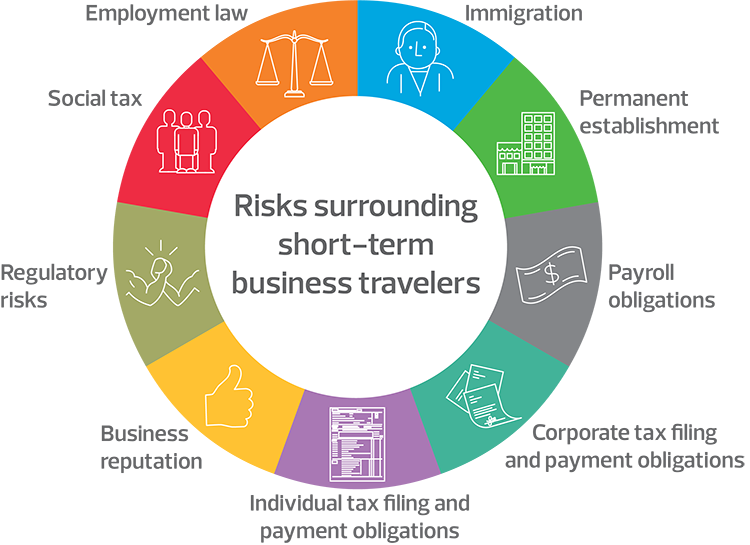Insights and Resources
Managing short-term business travelers
ARTICLE | May 15, 2022
Authored by RSM US LLP
Host countries have various tax reporting requirements and obligations which can cause significant administrative and tax burdens on the company, who may be unaware of their exposure to penalties and other regulatory risks.
RSM understands the challenges companies face tracking global business travelers and employees working remotely overseas. There is no one-size-fits-all solution. Having a foundation of key aspects to consider when sending employees overseas on short-term assignments, by country, can take considerable resources and time.
Sending employees to foreign jurisdictions
If you are sending employees to jurisdictions outside the United States, the following country-specific guides provide you, and your employees, with baseline information and insights before they arrive:
Belgium
For STBTs, a single permit needs to be requested before arrival in Belgium and covers both the right to stay in Belgium and the right to work in Belgium. Learn about other important considerations for U.S. STBTs working in Belgium:
Canada
Canadian tax residency rules are not based on citizenship and are actually based on a review of the primary and secondary ties to the country. Learn more:
China (mainland)
China resident individuals are generally subject to tax on their China-source and non-China-source income, while nonresident individuals are subject to tax on their China source income only. Learn more:
France
Short-term business travelers working in France should understand the definition of residency in country and ensure they are working under the appropriate visa. Other factors to consider:
Germany
To minimize the costs associated with conducting business in Germany, it is important for employers and employees to be aware of the tax implications when an employee works as an STBT in Germany. Learn more:
India
Ensuring travel to India is on the correct visa category is just one of many factors to consider when sending employees on short-term business assignments. Read more:
Mexico
Short-term business travelers who are coming to Mexico are generally subject to tax filing and payment of income tax on their Mexico-sourced income. Read other considerations when sending employees to Mexico:
Switzerland
There are two ways an STBT can be considered a Swiss tax resident. One involves being in the country for 90 days with no intention to exercise a gainful activity. Find out what the second is:
United Kingdom
Understanding the tax implications of working in the U.K. and planning travel and reporting accordingly is critical to the success of short-term assignments. Read more:
Short-term business travelers (STBTs) can trigger unexpected tax reporting obligations, for themselves and employers. STBTs are generally employees who work in another tax jurisdiction for a short period of time while maintaining tax residency in their home country. When sending employees on a short-term assignment, make sure to review the following areas:

Let's Talk!
Call us at +1 213.873.1700, email us at solutions@vasquezcpa.com or fill out the form below and we'll contact you to discuss your specific situation.
This article was written by RSM US LLP and originally appeared on May 15, 2022.
2022 RSM US LLP. All rights reserved.
https://rsmus.com/insights/services/business-tax/managing-your-short-term-international-travelers.html
The information contained herein is general in nature and based on authorities that are subject to change. RSM US LLP guarantees neither the accuracy nor completeness of any information and is not responsible for any errors or omissions, or for results obtained by others as a result of reliance upon such information. RSM US LLP assumes no obligation to inform the reader of any changes in tax laws or other factors that could affect information contained herein. This publication does not, and is not intended to, provide legal, tax or accounting advice, and readers should consult their tax advisors concerning the application of tax laws to their particular situations. This analysis is not tax advice and is not intended or written to be used, and cannot be used, for purposes of avoiding tax penalties that may be imposed on any taxpayer.
RSM US Alliance provides its members with access to resources of RSM US LLP. RSM US Alliance member firms are separate and independent businesses and legal entities that are responsible for their own acts and omissions, and each is separate and independent from RSM US LLP. RSM US LLP is the U.S. member firm of RSM International, a global network of independent audit, tax, and consulting firms. Members of RSM US Alliance have access to RSM International resources through RSM US LLP but are not member firms of RSM International. Visit rsmus.com/about us for more information regarding RSM US LLP and RSM International. The RSM logo is used under license by RSM US LLP. RSM US Alliance products and services are proprietary to RSM US LLP.

Vasquez & Company LLP is a proud member of the RSM US Alliance, a premier affiliation of independent accounting and consulting firms in the United States. RSM US Alliance provides our firm with access to resources of RSM US LLP, the leading provider of audit, tax and consulting services focused on the middle market. RSM US LLP is a licensed CPA firm and the U.S. member of RSM International, a global network of independent audit, tax and consulting firms with more than 43,000 people in over 120 countries.
Our membership in RSM US Alliance has elevated our capabilities in the marketplace, helping to differentiate our firm from the competition while allowing us to maintain our independence and entrepreneurial culture. We have access to a valuable peer network of like-sized firms as well as a broad range of tools, expertise and technical resources.
For more information on how Vasquez & Company LLP can assist you, please call +1 213.873.1700.